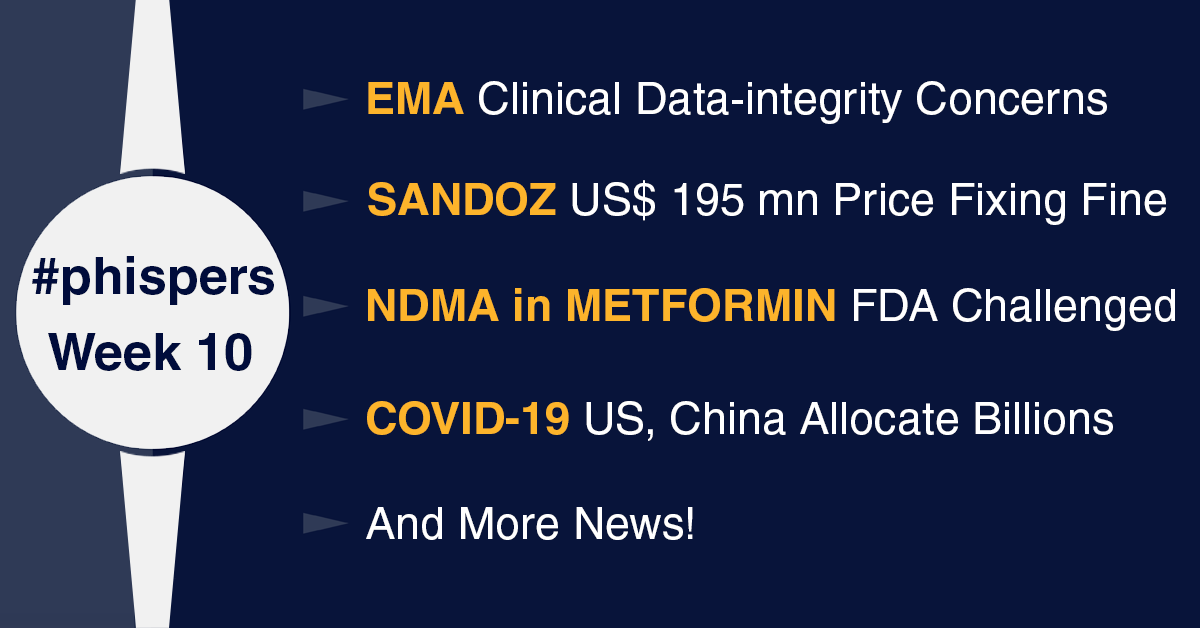
By PharmaCompass
2020-03-05
Impressions: 3043
This week, Phispers has more updates on Covid-19.
While US lawmakers approved an emergency bill of US$ 8.3 billion to fund the government’s response to the coronavirus outbreak, China had allocated US$ 15.58 billion in special funds by March 2 to prevent the spread of the disease. The week also saw several M&A deals.
While Thermo Fisher is acquiring Qiagen, a Dutch maker of tests for diseases including Covid-19 and cancer, for US$ 10 billion, Gilead is acquiring cancer biotech Forty Seven for US$ 4.9 billion.
Japanese drugmaker Takeda sold off its old headquarter in Chicago suburbs to Horizon Therapeutics and its Latin American brands to Brazil’s Hypera Pharma.
And GSK and AstraZeneca are selling their non-core businesses to focus on oncology.
Even though FDA cleared diabetes drug metformin of concerns that it carried high levels of NDMA impurity, testing laboratory Valisure has challenged those findings.
Meanwhile, Sandoz has agreed to pay a criminal penalty of US$ 195 million to settle price fixing allegations.
EMA raised data-integrity concerns at an Indian CRO in Mumbai.
And FDA approved Biohaven’s migraine drug, Esperion’s cholesterol drugs and Acacia Pharma’s post-operative nausea drug.
Sandoz
to pay record US$ 195 million fine to settle price fixing allegations
Sandoz Inc, a generic pharmaceutical company headquartered in New Jersey which is a part of Swiss drugmaker Novartis AG, was charged for conspiring to allocate customers, rig bids, and fix prices for generic drugs, the US Department of Justice (DOJ) said.
This represents the third pharmaceutical company to (after Heritage Pharmaceuticals and Rising Pharmaceuticals) admit to criminal antitrust charges in the Antitrust Division’s ongoing investigation. The charged conspiracies took place between 2013 and 2015. Charges against Heritage Pharmaceuticals and Rising Pharmaceuticals were also resolved with criminal penalties and deferred prosecution agreements.
The Antitrust Division also announced a deferred prosecution agreement under which Sandoz agreed to pay a US$ 195 million criminal penalty to resolve criminal charges of conspiring to fix prices and rig bids to stifle competition for generic drugs. This is the largest fine the department had levied in a domestic antitrust case.
Sandoz also admitted that the price-fixing affected more than US$ 500 million in its generic drug sales. Under the deferred prosecution agreement, Sandoz has agreed to cooperate fully with the Antitrust Division’s ongoing criminal investigation.
Officials said the company conspired between 2013 and 2015 with other drug manufacturers and their executives to raise prices for critical medications, hurting vulnerable consumers such as the elderly.
EMA
raises clinical data-integrity concerns at Indian CRO in Mumbai
Over the last four years, we have seen multiple contract research organizations (CROs) face flak from regulators. In what was reminiscent of the Semler Research Center and the Micro Therapeutics Research Labs episodes in 2016 and 2017, last week the European Medicines Agency (EMA) started a review of medicines for which studies had been conducted by Panexcell Clinical Laboratories Private Limited at its site in Mumbai, India.
This exercise by the European regulator follows a good clinical practice (GCP) inspection which raised concerns about the study data used to support marketing authorization applications of some medicines in the EU. The inspection was carried out jointly by Austrian and German authorities in October 2019.
Having considered the inspection findings, the German medicines agency (BfArM) requested EMA to assess the impact of these findings on the benefits and risks of medicines that have been authorized in the EU on the basis of studies performed by Panexcell at its site in Mumbai.
EMA has also been requested to look at the impact of the findings on medicines currently being evaluated for authorization. EMA will now review the available data to determine if any action is necessary to protect public health.
In April 2016, the FDA had come down heavily on Semler Research Center over issues of data manipulation. The FDA had told drug firms that their applications seeking approvals on the basis of studies done by Semler will not be accepted.
And in late-2016, EMA had raised data-integrity concerns over another CRO in India — Chennai-based, Micro Therapeutics Research Labs. The concerns had regulators reviewing the data of over 300 generic medicines being sold across Europe.
After
FDA clears metformin of NDMA risk, online pharmacy challenges results
Last month, the FDA had said its testing of type 2 diabetes drug metformin did not find any samples with unacceptably high levels of N-Nitrosodimethylamine (NDMA). But testing laboratory Valisure has challenged those findings in a petition, saying it discovered problems in 42 percent of the batches it checked.
Valisure said it tested 38 batches of diabetes medicine metformin from 22 companies and found 16 batches from 11 companies had the suspected carcinogen NDMA exceeding the FDA’s acceptable daily level of 96 mg. In fact, the petition says it found several batches contained levels that were 10 times the daily acceptable intake limit.
It also found “significant variability from batch to batch, even within a single company,” which it says in its petition underscores the need for expanded testing of some drugs at the batch level. Valisure also got another testing lab, Emergy Pharma, to check its findings and Emergy came to the same conclusions. Valisure has asked FDA to recall the batches in which it found issues.
“This certainly underscores the prevalence of existing pharma quality problems, which may end up becoming even worse as coronavirus continues to derail Chinese drug manufacturing, where the majority of US drugs originate from,” Valisure CEO David Light said.
Covid-19
impact: US approves emergency bill of US$ 8.3 billion; China allocates US$
15.58 billion
In its effort to confront a growing public health threat, the US legislature resoundingly approved US$ 8.3 billion in emergency aid on Wednesday to combat the novel coronavirus.
The bipartisan package, which includes nearly US$ 7.8 billion for agencies dealing with the virus, was put together after days of intensive negotiations. It is substantially larger than what the White House had proposed in late February. It also authorizes roughly US$ 500 million to allow Medicare providers to administer telehealth services so that more elderly patients, who are at greater risk from the virus, can receive care at home.
Representative Nita M. Lowey, Democrat of New York and chairwoman of the House Appropriations Committee said: “Strong funding in this legislation is a critical first step to enable a strategic, coordinated and whole-of-government response to the coronavirus.”
There is growing fear that the rapid spread of the virus will impact the US economy and will lead to significant disruption in people’s everyday lives.
“When it comes to Americans’ health and safety, there is no reason to be penny-wise and pound-foolish,” top Senate Democrat Chuck Schumer said.
Meanwhile, Chinese governments of every level had allocated a total of 108.75 billion yuan (US$ 15.58 billion) in special funds by March 2 to prevent the spread of the coronavirus epidemic.
Fu Jinling, head of the social insurance division of the Ministry of Finance, also said China had provided enterprises with 1 trillion yuan (US$ 144 billion) in social insurance payment relief this year to support the resumption of production.
He said China is aiming to cut the total tax burden on enterprises by 510 billion yuan (US$ 73.51 billion) this year, and was also allowing firms in the virus-stricken province of Hubei to waive insurance payments for five months.
Thermo
Fisher to buy diagnostic company for US$ 10.1 billion
After a slow start in 2020, M&A deals have gathered momentum in the pharmaceutical industry. US laboratory equipment maker Thermo Fisher Scientific Inc agreed to buy Qiagen NV, a Dutch maker of tests for diseases including cancer and the new coronavirus, for about US$ 10 billion (Euro 9 billion) in the biggest healthcare acquisition so far this year.
This is the largest purchase by Thermo Fisher after the company’s US$ 13.6 billion acquisition of Life Technologies in 2014. Qiagen employs approximately 5,100 people at 35 locations in more than 25 countries.
The deal is expected to close in the first half of 2021. Thermo Fisher expects synergies of US$ 200 million in the third year after completion of the acquisition.
“We are excited to bring together our complementary offerings to advance our customers’ important work, from discovery to diagnostics,” Marc N. Casper, chairman, president and chief executive officer of Thermo Fisher Scientific, said.
Thermo Fisher will assume US$ 1.4 billion (Euro 1.26 billion) in net debt, and will finance the purchase through cash, bridge financing and new debt.
When a new coronavirus emerged out of China, Qiagen got to work on a test to detect the virus in bodily fluids. The test is now being evaluated at four hospitals in China and one in France. The diagnostic gives results in about one hour.
Gilead buys cancer biotech for US$ 4.9 billion; Takeda, GSK, Astra to sell assets
This week, Gilead Sciences Inc said it would buy cancer biotech Forty Seven Inc for US$ 4.9 billion in cash. This acquisition adds another experimental treatment that targets blood cancer to Gilead’s portfolio of oncology drugs.
Through the acquisition, Gilead will have access to Forty Seven’s lead drug, magrolimab, that targets CD47, a molecule often known as the “don’t eat me signal”. Cancer cells use that signal to avoid the immune system. The biotech has shown a 50 percent response rate from its lead drug magrolimab in Myelodysplastic syndrome and a 40 percent complete response rate in acute myeloid leukemia in small trials. Forty Seven also has programs in lymphoma and bladder, colorectal and ovarian cancers.
The deal is Gilead’s largest acquisition since the company acquired Kite Pharma for US$ 11.9 billion in 2017. The deal is expected to complement the portfolio of Kite Pharma, and comes at a time when sales of Gilead’s hepatitis C drugs have seen a steep fall. Gilead’s Yescarta, a CAR-T therapy added through the acquisition of Kite, has gained market share as a treatment for certain types of diffuse large B-cell lymphoma.
Takeda sells HQ to Horizon, Latin American brands to Hypera: In a bid to lower its debts incurred due to the massive buy of Shire Plc, Japanese drugmaker Takeda sold off its US headquarters in Chicago suburbs to Horizon Therapeutics for US$ 115 million. Takeda’s old campus is situated in Deerfield, Illinois as the Japanese drugmaker relocated its US operations out of the Chicago suburbs to join Shire in the Greater Boston region.
The drug company is also offloading some of its non-core Latin American brands to Brazil’s Hypera Pharma. Under the agreement, Takeda will sell 18 branded prescriptions and consumer health drugs in Latin America to Brazil’s Hypera Pharma for US$ 825 million, the company said.
GSK may sell antibiotics business: GlaxoSmithKline Plc (GSK) is rekindling efforts to sell part of its antibiotics business. The British drugmaker is also pruning its portfolio to focus more on areas such as cancer, a Bloomberg report said.
According to sources quoted in the report, GSK is working with financial advisers on the potential divestment of its business making antibiotics called cephalosporins, including the Zinnat and Fortum brands. The portfolio could fetch several hundred million US dollars.
The drugs generate about US$ 200 million in annual revenue and GSK has started sounding out potential buyers including other antiobiotic makers as well as investment funds.
Emma Walmsley, CEO of GSK, is known to be betting big on oncology and is divesting older treatments in a bid to strengthen the company’s drug business.
Astra to sell non-core assets: Another company that plans to increase its focus on oncology by selling its non-core and underperforming assets is British-drugmaker AstraZeneca. The company has sold commercial rights for its hypertension drugs.
AstraZeneca said it has sold global commercial rights for hypertension drugs Inderal, Tenormin, Tenoretic, Zestril and Zestoretic to Atnahs Pharma to the tune of US$ 350 million and future milestone payments.
The future payments are sales contingent, AstraZeneca said, and could add up to US$ 40 million between 2020 and 2022.
The move comes a week after it divested most of its global rights for gastrointestinal drug Movantik to RedHill Pharma for US$ 68 million.
In October, AstraZeneca opted to sell most of its global commercial rights for Losec (omeprazole) for US$ 243 million to German pharma Cheplapharm Arzneimittel GmbH. The deal included sales-contingent milestone payments of up to US$ 33 million in 2021 and 2022, AstraZeneca said.
FDA approves Biohaven’s migraine drug, Esperion’s cholesterol drug
Last week, the FDA approved Biohaven Pharmaceutical Holding Company Limited’s oral pill — Nurtec ODT — for relieving pain after the onset of migraine headaches.
Chemically known as rimegepant, Nurtec ODT belongs to an emerging class of migraine treatments called calcitonin gene-related peptide (CGRP) inhibitors. It directly competes with Allergan Plc’s Ubrelvy, which became the first oral CGRP to be approved for acute migraine in December.
A single oral dose of the 75 mg tablet can provide fast pain relief, return patients to normal function within an hour, and remain effective for up to 48 hours in the case of many patients, the company said. Biohaven said 86 percent of patients treated with a single dose of the pill did not use a migraine rescue medication within 24 hours.
Esperion’s cholesterol buster: Esperion has been aiming to reconfigure the cholesterol-lowering market for sometime. Last week, it bagged its first FDA approval for its Nexletol (bempedoic acid) as a monotherapy for cholesterol. And this week, it won the FDA nod for a combination product — Nexlizet (bempedoic acid-ezetimibe) — that lowers LDL cholesterol in patients with high cholesterol or established atherosclerotic cardiovascular disease.
Despite both drugs sharing an active ingredient, Nexlizet boasts of more impressive data on its label as a phase 3 clinical study showed the drug lowered LDL cholesterol by 38 percent over a placebo. Nexletol, by contrast, posted an 18 percent reduction in its clinical program. Both drugs were approved for patients who have reached their maximum statin tolerance, the company said.
Nexletol and Nexlizet will be sold at a wholesale acquisition cost of US$ 10 per day.
Acacia’s post-operative nausea drug: Acacia Pharma has bagged FDA nod for its post-operative nausea and vomiting (PONV) drug Barhemsys (amisulpride injection).
“The approval of our first product represents a significant milestone in Acacia Pharma’s evolution into an integrated hospital pharmaceutical company with strong development and commercialization capabilities,” commented Mike Bolinder, Acacia Pharma’s CEO. Acacia intends to launch the drug with its own direct sales force in the second half of 2020.
The PharmaCompass Newsletter – Sign Up, Stay Ahead
Feedback, help us to improve. Click here
Image Credit : #Phisper Infographic by SCORR MARKETING & PharmaCompass is licensed under CC BY 2.0
“ The article is based on the information available in public and which the author believes to be true. The author is not disseminating any information, which the author believes or knows, is confidential or in conflict with the privacy of any person. The views expressed or information supplied through this article is mere opinion and observation of the author. The author does not intend to defame, insult or, cause loss or damage to anyone, in any manner, through this article.”






